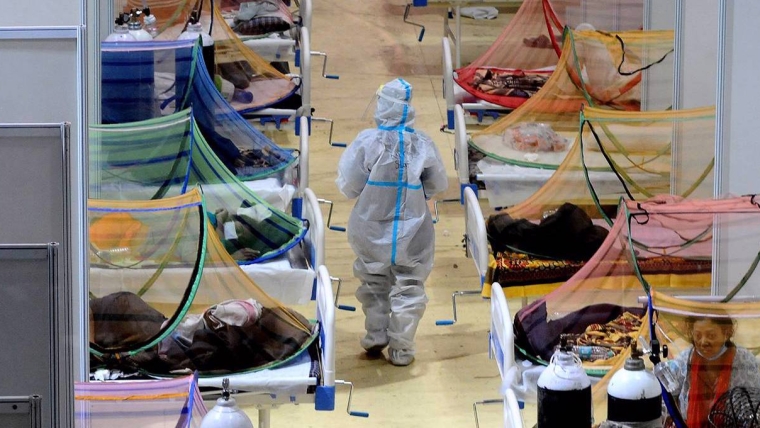
By Kevin Rudd*
Almost one-quarter of humanity lives on the Indian subcontinent. That fact is easily forgotten elsewhere, as world leaders focus on combating outbreaks of COVID-19 and its new variants within their own countries. But when our descendants pass judgment on this moment in history, they won’t remember just the lockdowns, face masks, and vaccination programs. They will also remember India and its neighbors.
They will remember how human remains have been found bloated and decomposing on the banks of the sacred River Ganges; how bodies had to be left in the heat outside crematoria, owing to a lack of wood for funerary pyres. They will remember how hospitals ran low on oxygen, medication, and hospital beds, while people lined up outside emergency departments and clinics begging for someone to save their loved ones.
All of this will be seared in memory and history. Beyond inflicting agony on the sick, the coronavirus outbreak in the world’s most populous democracy is now robbing victims of their dignity in death, too.
At the Asia Society, we hear accounts almost daily from friends and colleagues who have lost their relatives. According to one member of our Asia 21 Young Leaders network, “An uncle passed away last evening. Another the day before. A friend’s father last week. Everyone I know has someone they’ve lost.”
There are already too many of these stories, and now this tragedy is spilling across India’s borders. In Nepal, where one out of every two citizens is testing positive for the virus, the hardship is multiplied by the fact that India is the country’s principal supplier of vaccines and oxygen; that supply line is now shut down.
While these up-close images reveal an unfolding humanitarian calamity, the 30,000-foot perspective shows that things will only worsen as this deadly wave expands unchecked to rural areas of the subcontinent, where essential medical facilities are even scarcer. As fellow members of the human family, and as citizens of democracies that stand up for each other when help is required, we all need to act – governments, businesses, and private citizens. The quicker we do so, the more lives we might save.
Helping South Asia is not only the right thing to do; it is also in our own self-interest. The rampant spread of the virus anywhere can create more deadly variants that threaten all of us. So, what can be done?
Start with vaccination: we need to put shots into at least a billion arms as fast as possible. To date, fewer than 10% of citizens in each South Asian country (with the exception of Bhutan) have received at least one vaccine dose, according to Our World in Data. We must pull new levers to speed things up.
To that end, the rest of the world should join the United States and 100-plus other countries in backing a temporary World Trade Organization waiver of intellectual-property protections on vaccines. While not a silver bullet, this initiative, coupled with the removal of restrictions on related supplies and equipment, would help India’s sizable pharmaceutical industry to increase production, thereby reducing vaccine shortages domestically and in the region.
It is also incumbent on countries with excess vaccine supplies – particularly those in the developed world – to share the wealth. Earlier in the pandemic, India set an example by sending more than 66 million doses of vaccines to 95 countries around the world when it could have vaccinated its own people more rapidly. It is time to return the favour.
Equally important, more must be done to counter the scourge of misinformation. In an environment where fraudulent miracle cures are being propagated widely on social media, the world should help fund and support vaccine-literacy programs. Campaigns to increase the acceptance of masks, vaccines, social distancing, and other measures are needed especially in rural parts of the subcontinent, where complex sociocultural factors and linguistic diversity pose additional challenges.
Finally, there is the problem of insufficient oxygen – canisters, concentrators, and tankers to transport them. Of all the requests we have heard from our friends in the region, the plea for more oxygen has been the most urgent. India has only around 1,600 cryogenic tankers capable of transporting oxygen from production facilities to hospitals. And that includes the tankers it already supplied to Nepal, which itself has such a paucity of oxygen canisters that it is now asking mountaineers returning from Mount Everest to donate their empty ones.
Shipping cryogenic tankers and oxygen canisters to South Asia will help save the lives of those threatened by the shortage, rather than by COVID-19 itself. Here, developed countries with ample production capacity can help in ways that local nongovernmental organizations cannot – and help they must.
Ultimately, this pandemic, and the legacy of our global response, belongs to all of us. Each generation is confronted by challenges great and small, and this one is ours. Unless we can truly protect people everywhere by arresting the virus and slowing its mutations, we may find ourselves facing the prospect of a permanent pandemic.
*Kevin Rudd, a former prime minister of Australia, is President of the Asia Society Policy Institute. Copyright: Project Syndicate, 2021, and published here with permission.
8 Comments
Nah. We need to focus on our own people.
The world needs to depopulate anyway.
One assumes you put your hand up for this and volunteer your family as well?
No? Talk about being a moral hypocrite...
Who are 'our own people'? Are we talking families? cities? countries? ethnicity? religion? What line are you drawing to absolve responsibility to these people in desperate need?
One thinks you STILL have no understanding of the global economy, supply chains and the worlds inability to cope with systemic long term blockages of such, even though the impacts have been laid out for all to see this past year. One also thinks you STILL have no clue how far and wide spread peoples families and local companies employees are, and the impact that not being able to move about and return home has on the wellbeing of our communities. I agree with the assessment that the worlds current population growth has had a negative impact to date, but our understanding of such, the current downward trend in population growth as birth rates rapidly drop globally means we have a far better chance and resolving those impacts. To wish death on anyone, without first attempting every other method to improve the impact of the population on it's current environment, is highly shortsighted and dare I say conscienceless.
A permanent pandemic is not possible, it's just simple maths. Pandemics follow an exponential curve that looks incredibly scary but reaches a plateau level and decays very quickly - google "Gompertz Curve". Humanity, one way or another, acquires immunity. Add the natural level of T-cell immunity/resistance in populations, to the survivor's immunity, to the vaccine immunity, to the fact that it's impossible to die twice (i.e most of the vulnerable have already been taken) and it's impossible to avoid that conclusion.
Even the Black Plague burned itself out eventually.
When do you think the concept of 'Quarantine' came about? During the Black Plague. They quarantined ships, isolated the infected and those exposed to them. It helped us start to understand and improve our medical practices and infection controls. All that after approx 60%+ of Europe died. The Plague lasted centuries, with the biggest waves in Europe and Africa from the mid 1300's to the 1600's but it still exists today. The bacteria strain that caused the Black Death is likely extinct, but its modern relatives continue to cause bubonic plaque outbreaks. "...the present-day plague evolved from a less virulent species of bacteria, Yersinia pseudotuberculosis, which often causes "mild stomach infections." However, the bacterial strains that brought Europe to the brink of breaking resulted from TWO MUTATIONS. The first alteration cursed the world with Yersinia pestis, which had the capacity to cause pneumonic plague, a nasty lung infection that spread through sneezing or coughing. The second change spawned the bubonic plague that inflamed lymph nodes."
It still amazes me that people think immunity was and is the only solution. We never really conquer germs and viruses after they become widespread, we just wrestle them to a draw at best.
Agree 100%! So. I can hear the "Big Lie" coming.
Kevin Rudd another person living in perpetual fear and happy to do his best to spread it.
He talks of misinformation but he is misinforming in this very article:
"where one out of every two citizens is testing positive for the virus"
No. That's not what the article he quotes is saying. The BBC article says that the positivity rate is 50%. So, if that is true, half of all people being tested are testing positive. That is not really the same as half of all Nepals citizens testing positive.
One would result in 15 million cases the other 250 thousand. But hey Kevin don't worry you are in great company for overblowing this thing.

We welcome your comments below. If you are not already registered, please register to comment
Remember we welcome robust, respectful and insightful debate. We don't welcome abusive or defamatory comments and will de-register those repeatedly making such comments. Our current comment policy is here.